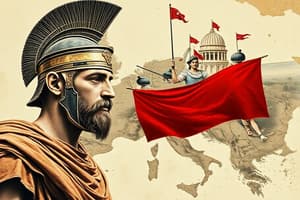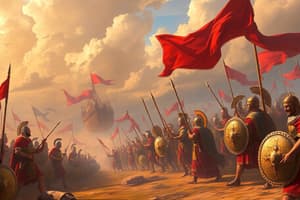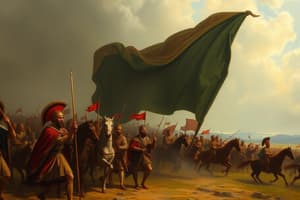Podcast
Questions and Answers
What was the 1st Punic War fought over?
What was the 1st Punic War fought over?
- Trade routes
- Resources in North Africa
- Control of Spain
- The island of Sicily (correct)
Who was a great Roman public speaker who supported a republic?
Who was a great Roman public speaker who supported a republic?
Cicero
How many consuls make up Rome's executive branch?
How many consuls make up Rome's executive branch?
2
What did Caesar do for people living outside Italy?
What did Caesar do for people living outside Italy?
What is the Roman Colosseum?
What is the Roman Colosseum?
What was the purpose of the Praetorian Guard?
What was the purpose of the Praetorian Guard?
What happened to the city of Carthage after the war?
What happened to the city of Carthage after the war?
What did Romans adopt in 451 B.C.?
What did Romans adopt in 451 B.C.?
What was a significant contribution of Roman engineering?
What was a significant contribution of Roman engineering?
What did Caesar create that is related to time?
What did Caesar create that is related to time?
What established fair and equal rights for all Roman citizens?
What established fair and equal rights for all Roman citizens?
In 509 B.C., Rome became a ______.
In 509 B.C., Rome became a ______.
Who were the founders of Rome?
Who were the founders of Rome?
What major historical events marked the year 14 A.D.?
What major historical events marked the year 14 A.D.?
What term describes wealthy landowners in Rome?
What term describes wealthy landowners in Rome?
What did small farmers, merchants, and artisans constitute in Roman society?
What did small farmers, merchants, and artisans constitute in Roman society?
Flashcards are hidden until you start studying
Study Notes
Roman Wars and Governance
- The 1st Punic War was fought between Rome and Carthage over Sicily, resulting in a Roman victory.
- Rome's executive branch consists of 2 consuls, contrasting with the U.S. executive branch, which has 1 president.
- Julius Caesar extended citizenship beyond Italy and enacted reforms such as land redistribution and the creation of the Julian Calendar.
Military Structure
- Professional soldiers numbered around 150,000, including the Praetorian Guard, which comprised 9,000 soldiers dedicated to emperor protection.
Key Historical Events
- Significant events include the adoption of the 12 Tables in 451 B.C., the destruction of Carthage in 146 B.C., and the death of Augustus in 14 A.D.
- During the Punic Wars, Carthage was devastated, leading to an enslavement of 50,000 people and the burning of the city.
Infrastructure and Society
- Rome was known for its aqueducts, stone arches, and pipes utilized for transporting water over long distances.
- Wealthy landowners held large estates, while the development of a standard currency and measures facilitated trade.
Cultural and Literary Contributions
- The epic story of a Trojan soldier who settled in Rome highlights the city's mythical origins, as seen in works like the Aeneid.
- The Julian Calendar introduced by Caesar consisted of 12 months and 365 days, including a leap year for accuracy.
Social Classes and Rights
- The Plebeians were represented by a group that could pass laws in the Senate starting in 287 B.C.
- The establishment of written laws aimed to secure fair rights for all Roman citizens amidst a power struggle between patricians and plebeians.
Notable Personalities
- Key figures included the triumvirate of Crassus, Pompey, and Julius Caesar, along with emperors such as Nero, Caligula, Claudius, and Tiberius.
- Caesar's assassination resulted from Senate fears that he intended to establish a monarchy.
Overall Impact
- The Roman Republic was established in 509 B.C., introducing elected leadership and citizen governance.
- The societal divide was further highlighted by the ongoing struggles of poor farmers, leading to proposed reforms for land redistribution.
Miscellaneous
- The Apennines Mountains are a significant geographical feature of Italy, shaping the region's development and defense.
- Various luxury goods, including silk, spices, and olive oil, were important to the Roman economy and trade.
Studying That Suits You
Use AI to generate personalized quizzes and flashcards to suit your learning preferences.




